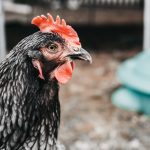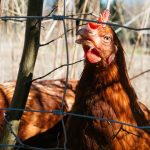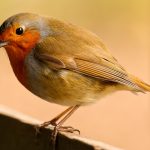Winter presents challenges for chickens, necessitating proper winterization of coops to ensure flock safety and comfort. Insulation is a key factor in maintaining warmth. This can be achieved by adding extra bedding materials like straw or wood shavings to the coop floor.
Insulating walls and ceilings with foam board or other insulation materials helps retain heat. However, adequate ventilation remains crucial to prevent moisture accumulation, which can lead to respiratory issues in chickens. Eliminating drafts is another essential aspect of winterization.
Inspect the coop for gaps or cracks in walls and windows, sealing them with caulk or weather stripping. Protect the coop from snow and wind by adding external barriers such as tarps or plastic sheeting, which provide additional insulation and protection. In extremely cold climates, consider incorporating heat sources like heat lamps or heated waterers to maintain a suitable temperature within the coop during the coldest periods.
Table of Contents
- 1 Providing Adequate Shelter
- 2 Adjusting Feeding and Watering
- 3 Maintaining Egg Production
- 4 Protecting Against Predators
- 5 Monitoring Health and Wellness
- 6 Keeping Your Chickens Entertained
- 7 FAQs
- 7.1 What are some important considerations for keeping backyard chickens in winter?
- 7.2 How can I provide adequate shelter for my backyard chickens in winter?
- 7.3 How can I ensure that my backyard chickens have access to fresh water in winter?
- 7.4 How should I adjust my backyard chickens’ diet for winter?
- 7.5 How can I protect my backyard chickens from predators in winter?
- 7.6 What are some tips for protecting backyard chickens from extreme weather conditions in winter?
Key Takeaways
- Insulate the coop and provide extra bedding to keep chickens warm during winter.
- Ensure the coop is well-ventilated but protected from drafts to provide adequate shelter.
- Increase the amount of feed and provide warm water to help chickens maintain body temperature.
- Use artificial lighting to maintain egg production during shorter daylight hours.
- Secure the coop with locks and barriers to protect against predators.
- Monitor chickens for signs of illness and provide necessary care.
- Provide toys and perches to keep chickens entertained and reduce stress.
Providing Adequate Shelter
Creating a Sheltered Outdoor Area
Provide your chickens with a covered run or outdoor area where they can get fresh air and exercise without being exposed to harsh weather conditions. You can use tarps or other materials to create a sheltered area within the run, or consider building a permanent structure with a roof to provide protection from rain and snow.
Providing a Dry and Comfortable Roosting Area
Ensure your chickens have a dry place to roost at night by covering and protecting the roosting bars from rain and snow. Consider adding extra bedding to keep them warm and comfortable. If you have a larger flock, you may need to provide multiple roosting areas to ensure all your chickens have a place to rest.
Additional Shelter through Nesting Boxes
Provide additional shelter in the form of nesting boxes, located in a dry, protected area of the coop. Fill these boxes with plenty of clean bedding to keep your hens comfortable while they lay their eggs. By providing adequate shelter for your chickens, you can help keep them safe and healthy throughout the winter months.
Adjusting Feeding and Watering

During the winter months, it’s important to adjust your chickens’ feeding and watering routines to ensure that they are getting the nutrients and hydration they need to stay healthy. One of the first things you’ll want to do is increase their feed intake to help them stay warm and maintain their energy levels. This can be done by providing a higher protein feed or supplementing their diet with additional grains and seeds.
You’ll also want to make sure that your chickens have access to fresh, unfrozen water at all times. This may involve investing in a heated waterer or checking their water supply multiple times a day to ensure that it hasn’t frozen over. It’s important to keep their water source clean and free of debris, as chickens can be more susceptible to illness during the winter months.
In addition to adjusting their feed and water intake, you may also want to consider providing your chickens with additional treats and supplements to help boost their immune systems and keep them healthy. This can include things like mealworms, scratch grains, or even small amounts of fruits and vegetables. By making these adjustments to their feeding and watering routines, you can help ensure that your chickens stay healthy and happy throughout the winter.
Maintaining Egg Production
Maintaining egg production during the winter months can be a challenge, but there are steps you can take to help encourage your hens to keep laying. One of the first things you’ll want to do is make sure that your hens are getting enough light. Chickens need around 14 hours of daylight to maintain consistent egg production, so if you live in an area with shorter days during the winter, you may need to supplement their light with artificial lighting in the coop.
You’ll also want to make sure that your hens are getting a balanced diet with plenty of protein and nutrients to support egg production. This may involve adjusting their feed or providing additional supplements to ensure that they are getting everything they need. It’s also important to keep their nesting boxes clean and comfortable, as hens are more likely to lay eggs in a clean, cozy environment.
Finally, make sure that you are collecting eggs regularly to prevent them from freezing or cracking in cold temperatures. Check the nesting boxes multiple times a day and remove any eggs promptly to ensure that they stay in good condition. By taking these steps, you can help maintain egg production throughout the winter months and keep your flock healthy and productive.
Protecting Against Predators
Predators can be a threat to your chickens year-round, but they may be more active during the winter months when food is scarce. It’s important to take steps to protect your flock from predators and keep them safe in their coop and outdoor run. One of the first things you’ll want to do is inspect the perimeter of your coop and run for any signs of damage or weakness that could allow predators to gain access.
This may involve repairing fences, reinforcing doors, or adding additional barriers such as hardware cloth or predator-proof netting. You’ll also want to make sure that your chickens are securely locked up at night to prevent predators from getting into the coop. This may involve installing locks or latches on doors and windows, as well as adding predator-proofing measures such as motion-activated lights or alarms.
If you have free-ranging chickens, consider providing them with a secure outdoor area during the day where they can still get exercise without being exposed to potential predators. Finally, consider adding deterrents such as predator decoys or sound devices to help keep predators away from your coop and run. By taking these steps, you can help protect your flock from predators and keep them safe throughout the winter months.
Monitoring Health and Wellness

Monitoring for Signs of Illness
Regularly inspect your chickens for any changes in behavior, such as lethargy or decreased appetite, as well as physical symptoms like sneezing, coughing, or discharge from the eyes or nose. This will help you identify any potential health issues early on.
Providing a Comfortable Environment
Make sure your chickens are staying warm and dry by providing extra bedding in the coop, ensuring their water supply is unfrozen, and checking for drafts or leaks that could let cold air or moisture in. This will help reduce their risk of illness and keep them comfortable.
Maintaining Mental Well-being
Chickens can become bored or stressed during the winter months when they’re cooped up indoors. To combat this, provide enrichment activities such as hanging treats, offering perches or roosts to explore, or even playing soothing music in the coop. This will help keep them mentally stimulated and happy.
By closely monitoring your chickens’ health and wellness throughout the winter months, you can help ensure they stay healthy and happy despite the challenges of cold weather.
Keeping Your Chickens Entertained
Keeping your chickens entertained during the winter months is important for their mental well-being and overall happiness. Chickens can become bored when they are cooped up indoors for long periods of time, so it’s important to provide them with enrichment activities to keep them stimulated and engaged. One way to do this is by providing them with hanging treats or puzzle feeders that require them to work for their food.
You can also provide your chickens with perches or roosts for them to explore, as well as items such as mirrors or shiny objects that can provide visual stimulation. Some chicken owners even play soothing music in the coop to help keep their flock calm and entertained during the winter months. Another way to keep your chickens entertained is by providing them with opportunities for exercise and exploration.
If you have a secure outdoor area for your chickens, consider letting them out for supervised free-ranging time during the day so they can stretch their legs and peck around for bugs and other treats. By providing your chickens with plenty of enrichment activities and opportunities for exercise during the winter months, you can help keep them happy and healthy despite being cooped up indoors.
If you’re considering keeping backyard chickens in winter, you may also want to think about keeping ducks. Ducks can be a great addition to your flock and have different dietary needs than chickens. Check out this article on what you should feed ducks to learn more about how to care for these waterfowl.
FAQs
What are some important considerations for keeping backyard chickens in winter?
Some important considerations for keeping backyard chickens in winter include providing adequate shelter, ensuring access to fresh water, adjusting their diet, and protecting them from predators and extreme weather conditions.
How can I provide adequate shelter for my backyard chickens in winter?
To provide adequate shelter for backyard chickens in winter, it is important to ensure that the coop is well-insulated, draft-free, and free from moisture. Adding extra bedding and using heat lamps or heated waterers can also help keep the chickens warm.
How can I ensure that my backyard chickens have access to fresh water in winter?
To ensure that backyard chickens have access to fresh water in winter, it is important to regularly check and refill their water containers to prevent freezing. Using heated waterers or adding a small amount of apple cider vinegar to the water can also help prevent freezing.
How should I adjust my backyard chickens’ diet for winter?
In winter, it is important to adjust your backyard chickens’ diet by providing them with additional calories to help them stay warm. This can be done by offering them high-quality, high-protein feed and providing extra treats such as scratch grains and mealworms.
How can I protect my backyard chickens from predators in winter?
To protect backyard chickens from predators in winter, it is important to ensure that the coop is secure and that any gaps or holes are sealed to prevent entry. Using motion-activated lights or alarms can also help deter predators.
What are some tips for protecting backyard chickens from extreme weather conditions in winter?
Some tips for protecting backyard chickens from extreme weather conditions in winter include providing windbreaks, using tarps or plastic sheeting to cover the coop, and ensuring that the chickens have access to a dry, well-drained area for exercise.
Meet Walter, the feathered-friend fanatic of Florida! Nestled in the sunshine state, Walter struts through life with his feathered companions, clucking his way to happiness. With a coop that’s fancier than a five-star hotel, he’s the Don Juan of the chicken world. When he’s not teaching his hens to do the cha-cha, you’ll find him in a heated debate with his prized rooster, Sir Clucks-a-Lot. Walter’s poultry passion is no yolk; he’s the sunny-side-up guy you never knew you needed in your flock of friends!







